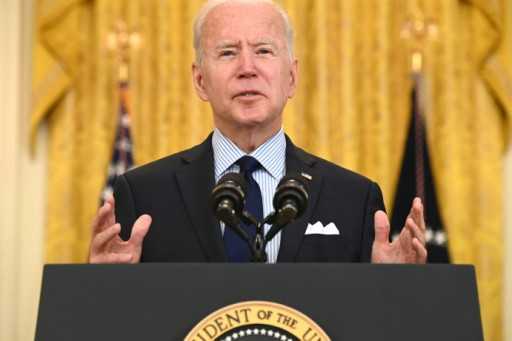Disappointing April jobs data pose new challenge for Biden agenda
09 May, 2021

The United States added just 266,000 jobs in April -- 25 % of the quantity expected -- in a surprise setback for President Joe Biden's efforts to regenerate an economy blighted by the COVID-19 pandemic.
The weak hiring also pushed the unemployment rate up slightly to 6.1 percent, according to the Labor Department's monthly employment report released Friday.
The info defied economists' upbeat predictions that widespread vaccines and government relief measures allows businesses to return on track and add one million jobs last month.
Biden said such setbacks are not unusual during recoveries, and the report undermined criticism that his massive spending programs weren't needed because the economy had been recovering.
"We knew we were facing a once-in-a-century pandemic and once-in-a generation monetary crisis. We knew this wouldn't be considered a sprint, it'd be a marathon," the president said in comments following data release.
He again called on Congress to approve two spending proposals costing a lot more than $4 trillion that are targeted at revamping U.S. infrastructure and the workforce.
"We can not let up. This jobs report makes that clear. We have too much work to accomplish," he said.
While analysts say the jobs rebound may still happen in coming months, the report however complicates that assumption.
"This is a big miss that changes how we take into account the recovery," University of Michigan economics professor Justin Wolfers said on Twitter.
On Wall Street, the Dow and S&P 500 finished at record highs, with investors about the weak report as bettering the probabilities Biden's spending plans are approved and the Federal Reserve keeps interest levels lower for longer.
Unemployment surged in america when the pandemic started out in March 2020, but has declined in the year since, aided by the vaccines and three massive government rescue packages.
The April data show the economy has 8.2 million fewer jobs than it had in February 2020, before the pandemic hit.
In March, Biden signed the $1.9 trillion American Rescue Plan, and is now asking Congress -- which his Democrats only barely control -- to pass a $2.3 trillion jobs and infrastructure proposal targeted at fighting climate change and revamping roads, bridges and other infrastructure.
He also proposed a $1.8 trillion intend to expand education, childcare and social programs.
The Republican opposition has generally regarded his proposals as a spending spree fueled by tax increases they see as harming American competitiveness, and lawmakers pointed to the downbeat employment numbers to create their case.
"This terrible jobs report must serve as an essential reminder that jacking up taxes now face to face creators will absolutely only get this to situation worse," Republican congressman Lee Zeldin tweeted.
Meanwhile, some business groups just like the U.S. Chamber of Commerce argue that generous pandemic unemployment benefits are making it hard for companies to fill open positions.
But Biden downplayed that concern, saying there was no measurable impact from the excess $300 in weekly aid the American Rescue Plan offered jobless workers.
Treasury Secretary Janet Yellen argued that the hiring data was "a bit stronger than the headline numbers might suggest."
Talking with reporters at the White House, Yellen pointed to a decline of almost 600,000 in the number of men and women working part-time because these were unable to find full-time work, and also a rise in average hours worked.
The data showed important sectors were rehiring, with the leisure and hospitality sector -- comprising the bars and restaurants hardest-hit by pandemic business closures -- adding the most jobs with a gain of 331,000 last month.
However, that hiring was offset by jobs losses among non permanent personnel and couriers and messengers, which fell 111,000 and 77,000, respectively.
Meanwhile, automobiles and parts manufacturers lost 27,000 positions, perhaps a sign the global semiconductor shortage which has forced American automakers to cut production is going for a toll.
After decreasing slightly in March, average hourly earnings increased by 21 cents to $30.17, the report said, a sign that shortages of employees could be forcing businesses to up their compensation.
The Labor Department also revised its strong March report downwards showing 770,000 positions added, 146,000 less than in the beginning reported, though hiring in February was revised up by 68,000.
Analysts who had forecast a large employment gain in April differed as to why this report was such an enormous miss.
"Health issues and child/elder care issues tend weighing on payroll growth," Rubeela Farooqi of High Frequency Economics said in an analysis.
But she and other economists predict more powerful rehiring in the months to come.
"The reality is that the labor market is tightening and the thing keeping job gains down is supply, not demand," economist Joel Naroff said. "The economy is racing forward and that is what we should focus on."
Source: japantoday.com
TAG(s):
